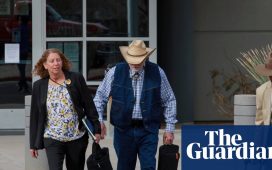Thousands of Haitian migrants at the Mexico-US border in Texas face a ramped-up US exclusion effort, with six expulsion flights to Haiti on Tuesday. Mexico has begun busing some away.
More than 6,000 had been removed from an encampment at Del Rio, Texas, US officials said on Monday as they defended a strong response that included immediately expelling migrants to their impoverished Caribbean country and faced criticism for using horse patrols to stop them entering the town.
Some Haitian migrants returned to Mexico, while others struggled to decide where to take their chances.
Marie Pierre, 43, stood on the Mexican side of the Rio Grande as night fell, with hundreds of others, unsure what to do. She said border patrol agents separated her from her 19-year-old son in Texas and she didn’t know if he had been deported. She waited for a chance to charge her phone, hoping to get news from family in Florida.
“They told me he was an adult and couldn’t be with us,” she said of the moment they were separated.
Earlier, the homeland security secretary, Alejandro Mayorkas, conceded it was a “challenging and heartbreaking situation” but issued a stark warning: “If you come to the United States illegally, you will be returned. Your journey will not succeed, and you will be endangering your life and your family’s life.”
Officials from Mexico’s National Human Rights Commission walked among migrants, signing up those interested in applying for asylum. This year, more than 19,000 Haitians have opted to do so.
Mexican authorities detained some migrants. The first busloads pulled out on Sunday and empty buses arrived on Monday.
Some humanitarian workers said they had seen Mexican national guard troops help immigration agents detain a group of 15 to 20 in Acuna. A federal official said the plan was to take the migrants to Monterrey, in northern Mexico, and Tapachula, in the south, with flights to Haiti to follow.
Mayorkas and border patrol chief Raul Ortiz said they would look into agents on horseback using what appeared to be whips and their horses to push back migrants at the river between Ciudad Acuña and Del Rio, a city of about 35,000 roughly 145 miles west of San Antonio where thousands of migrants are camped around a bridge.
The Department of Homeland Security called the footage “extremely troubling” and promised a full investigation that would “define the appropriate disciplinary actions”.
Mayorkas said 600 homeland security employees had been brought to Del Rio. He said he had asked the defense department for help in what may be one of the swiftest large-scale expulsions of migrants and refugees in decades. He also said the US would increase the pace and capacity of flights to Haiti and elsewhere.
The number of migrants at the bridge peaked at 14,872 on Saturday, said Brandon Judd, president of the National Border Patrol Council.
The expulsions were made possible by a pandemic-related authority adopted by Donald Trump in March 2020 that allows for migrants to be removed without opportunity to seek asylum. Joe Biden exempted unaccompanied children from the order but let the rest stand.
Any Haitians not expelled are subject to immigration laws, which include rights to seek asylum and humanitarian protection. Families are released in the US because the government cannot generally hold children.
Haitians have been migrating to the US in large numbers for several years, many having left after a devastating 2010 earthquake. Many make the dangerous trek by foot, bus and car, including through the Darien Gap, a Panamanian jungle.
Some at the Del Rio camp said the recent earthquake in Haiti and the assassination of the president, Jovenel Moise, made them afraid to return.
“It’s not right,” said Jean Philipe Samus. “The Americans are grabbing Haitians and deporting everyone to Haiti. Haiti has no president, no jobs, there is nothing. In the earthquake a lot of people died. It’s not right over there, I’m going back to Mexico.”
Mayorkas defended his decision to grant Haitians temporary legal status due to political and civil strife in their homeland if they were in the US on 29 July, but not to those being sent back now.
“We made an assessment based on the country conditions … that Haiti could in fact receive individuals safely,” he said.






